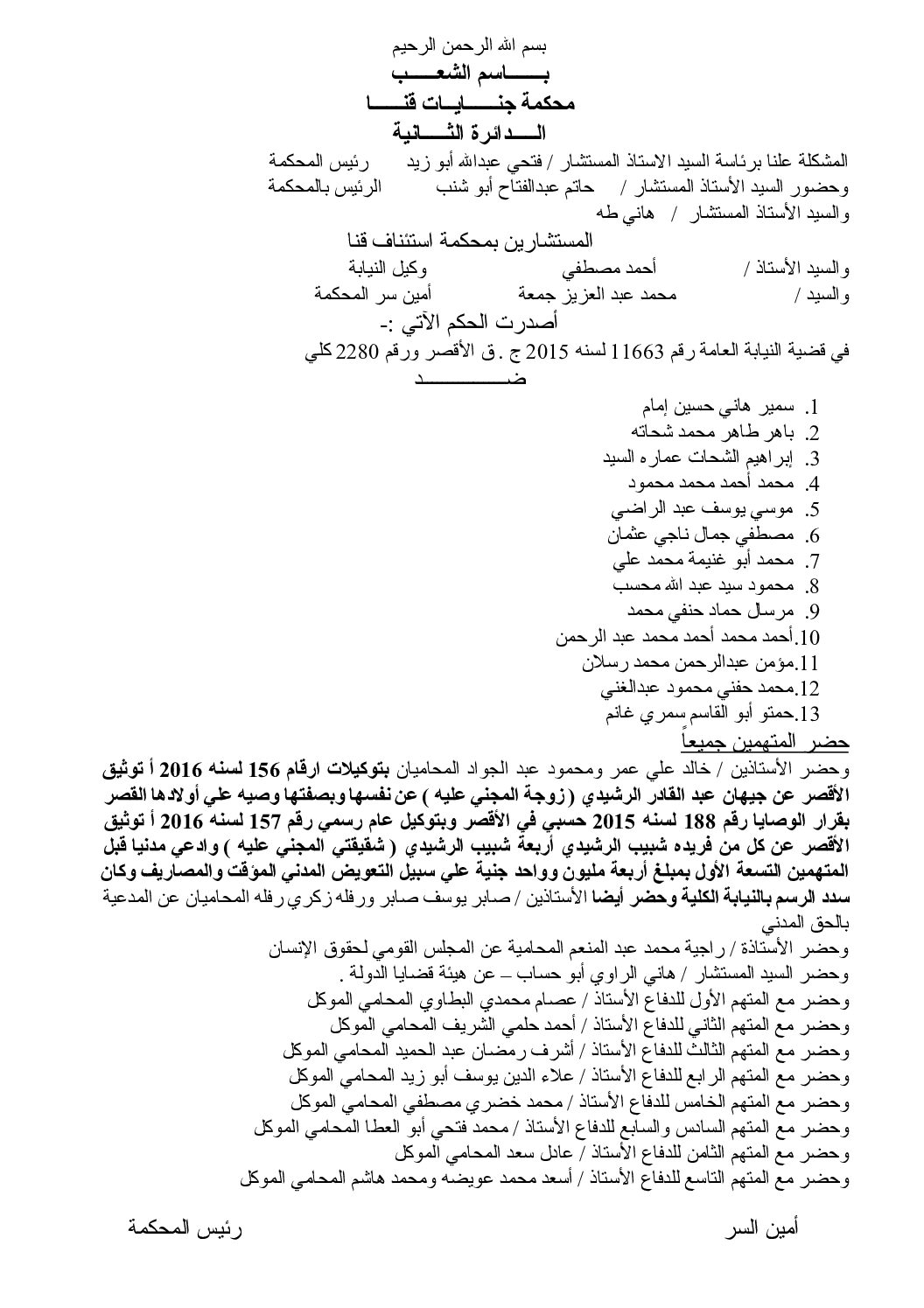On the International Anti-Corruption Day, Corruption is Still Epidemic in Egypt

The world celebrated yesterday, the 9TH of December, of the International Anti-Corruption Day, which commemorates the completion of the United Nations Convention against Corruption by the end of 2003. This anniversary comes to remind the world of the prevalence of corruption in many countries, and its negative effects on the ability of states to perform their roles in terms of development and providing services to their citizens—since corruption prevents citizens from enjoying their rights.
In Egypt, this day comes amid disagreements about the extent of corruption in Egypt. While some insisted that Egypt is witnessing an improvement in corruption indicators, others said that the Egyptians did not see any real sign of improvement in the situation in terms of the spread of corruption, pointing out that corruption is a daily experience for all Egyptians. Although some exerted concerted efforts to assert that Egypt “is not the most corrupt country,” the catastrophic situation of corruption in Egypt is not a matter of who’s the most or the least corrupt, nor it is a nominal crisis that can be resolved when an international organization announces an improvement in the Egyptian Index (which remains at the bottom compared to other countries).
Corruption problem is a problem of all Egyptians. It is not only that Egyptians are forced to pay some amount of money for the carrying out of bureaucratic procedures or to escape from traffic penalties and other irregularities, but the biggest problem in corruption is that the spread can be translated to main issues in Egypt. First, corruption causes the loss of public money, which is supposed to be used on public spending such as health, education, social security and others. Second, the most important problems of corruption is the so-called control of corruption: it means the extent of misuse of power to elevate private or certain elites interests, which constitutes a crisis in the government system in general. In this case the regime pursues protecting the interests of the rich and ignoring the rest of the social strata at the very least, if not directly marginalizing them through, for example, austerity policies.
Indicators and reports of corruption: Egypt is better than one third of the states, and the worst of the two-thirds
This year Egypt ranked 94 in the Corruption Perceptions Index issued by International Transparency (an index on the assessment of countries according to the vision and perception of stakeholders in a given country about the extent of penetration of corruption in one year by using different surveys of experts and business owners.) The index is measured from 0 to 100: 0 means “severe corruption”, while approaching 100 indicates that the state is free of corruption, or what IT calls “very clean”. After evaluating each state by a degree of 100, the ranking of countries is determined according to their scores approaching 100, or in other words according to the approach of any state to the “very clean” principle. Hence, the degree of Egypt was 32 of 100 in 2013, which ranked it 114 in terms of cleanliness or corruption-free. This means that there were 113 countries less corrupt than Egypt, or more “cleaner”. In 2014, the survey elevated Egypt to 37 out of 100 and ranked it 94 in terms of cleanliness or corruption-free. This means that there were 93 countries less corrupt than Egypt, or “cleaner”. Despite the fact that Egypt index has improved compared to last year, it does not mean that corruption has been undermined or even anti-corruption measures have been taken. The rank does not depend on the performance of Egypt only, but depends on the performance of other countries. Tunisia, for example, has seen a little deterioration in corruption index, which means they left their rank to another state. The state of Serbs, for instance, had moved from the rank 72 to the 78 less corrupt state, although its grade dropped one degree between 2013 and 2014, from 42 to 41 of 100. Furthermore, the index measures the perceptions and visions, and so, if the confidence of the business community in the Egyptian state increases, it would be translated into confidence that corruption would decrease (and it may be premature). Finally, no matter how high the rank of Egypt, it still puts Egypt among the most corrupt countries. Egypt was included within the degrees 30-39 group, which puts Egypt at risk in terms of the spread of corruption. Finally, one of the statistics confirmed that 40% of companies were forced to pay in bribes or “gifts” to get permits and papers (CIPE 2009).
Although the index never tells the real situation in any country, it remains a means of comparison between countries, and between progress and deterioration of one country over the years. It is also a way to access public opinion with a clear uncomplicated message over the economic situation in Egypt and the prevalence of corruption. Hence, we remind you that the IT index for “control of corruption” puts Egypt in the rank of 37%, meaning that the situation in Egypt is better than one third of the world countries, and the worst of the other two-thirds in terms of abuse of power and personal interests. On the other hand, the performance of Egypt in other indices such as the World Bank Index of Good Governance is not better off; the World Bank puts Egypt in low rank in several indicators related to the role of law, legislative oversight and the effectiveness of government.
Finally, Ernst & Young, one of the largest corporates for accounting and financial services, which have many works in Egypt, issued a report detecting the spread of corruption and fraud in the financial statements, and the prevalence of bribery in Egypt, based on interviews with a number of businessmen and managers of companies in Egypt. The “International Thirteenth Report of Fraud” issued by Ernst & Young appeared to confirm, through the interviews conducted, that the perceptions of fraud in Egypt in the field of business was about 44%, and 80% of the sample interviewed said that corruption was widespread in Egypt. Although the report has been criticized because of the small sample surveyed compared to the size of Egypt, the centralization of Egypt and the centralized administrative system and the business climate in Cairo justify such limited surveys.
Egypt ratified the Convention against Corruption, and the application is still far away
Apart from the various indices, the International Anti-Corruption Day comes in a very critical time in which Egypt is witnessing a legalization of corruption:
Egypt is one of the countries ratified the United Nations Convention against Corruption, which addresses the details of the fight against corruption. The Convention provides for many articles that deal with: 1) preventive measures such as the choice of the public servants, training and rehabilitating them and ensuring the rotation of positions, and providing them with fair wages— low wages are of the most important incentives for accepting bribes and the spread of corruption; 2) rules for public funds and national budget management; 3) transparency through adopting adequate and effective channels for citizens to report corruption along with providing serious protection for whistle blowers, experts and victims in corruption cases; 4) making national anti-corruption laws, and the formation of a national anti-corruption bodies; 5) clarifying many of corruption crimes such as abuse of power, authority position crimes, embezzlement, bribery, money laundering, illicit enrichment, and obstruction of justice; 6) describing how to ensure the implementation of hunting down, investigation and punishment for those who proved guilty in any of corruption crimes.
Egypt: legalization of corruption, reconciliation with crimes, and ignoring court verdicts
But despite the ratification of Egypt to this Agreement, the effective implementation of these policies and procedures is still very limited. To make things worse, Egypt continues to adopt measures that would “hide corruption” and legalize immunity for those who practice corruption in Egypt. ECESR is launching a legal struggle against a lot of individuals and bodies who try to legalize corruption. On top of them, the constitutional appeal against the Immunization of Corrupt Contracts Law No. 32/2014 passed by the interim President Adly Mansour in 2014 in order to prevent any third party from challenging the corruption of any contracts, allocation or sale carried out by the State. Needless to say, it denies citizens from the most important channel (the litigation channel) to expose corruption, which many citizens, workers and others have used to defend public money and reveal pervasive and widespread corruption in the deals carried out by the state.
ECESR also stands firmly against the stunning contempt of the decisions handed down by the Egyptian administrative courts in contracting corruption lawsuits. Tanta Flax and Nubaseed companies were restored this month to the investor Abdel-Elah Alkahki by the current government led by Mihleb, despite a court verdict against the corruption of contracts and ordered returning the two companies to the State again. This, of course, weakens the Egyptian judiciary and threatens the rule of law that we all work to build. This is the kind of state that ignores and violates court rulings and denies citizens access to court to defend public money. The terminated 1971 Constitution provided that, “public ownership shall have sanctity, and protecting and supporting it is the duty of every citizen.” The state suddenly decided to withdraw this right, or the duty, of the citizens, why? Is it out of fear of exposing corruption and the protection of a new corruption?
Furthermore, the state promulgated other laws in the field of investment that allow reconciliation in crimes of corruption and the seizure of public money outside the scope of courts. By doing this, no legal deterrent has been left, as well as surpassing the idea that corruption is a crime. It deals with economic crimes as simply administrative mistakes that do not require the intervention of judiciary. This, of course, would promote corruption and diminish the role of citizens in holding those responsible accountable.
Corruption bleeds economy
Finally, it is necessary to recognize the scale of rampant corruption in Egypt, and its appalling impact on the economy and the daily life of the Egyptians. It is estimated that Egypt loses, due to non-legitimate external flows, more than 40 billion pounds annually because of corruption. This amount is equivalent to that earmarked for the health budget in the current year, which is about 42 billion pounds.
Despite the fact that President al-Sisi has pledged to fight corruption, and that Prime Minister Ibrahim Mahlab has submitted a strategy to the President to fight corruption, the Egyptian Center emphasizes that no strategy could really fight corruption without involving the citizens, the real custodians of public money. Hence, the government has to abolish the above-mentioned Law No. 32 of 2014.

